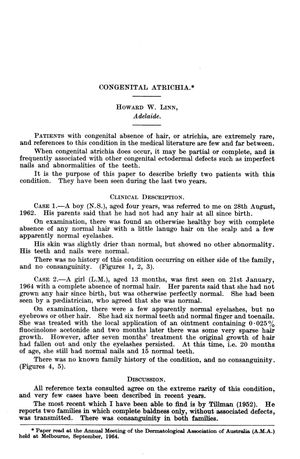TLDR Congenital atrichia is a rare condition where children are born without hair, and treatment is often ineffective.
The paper described two cases of congenital atrichia, a rare condition characterized by the complete absence of hair from birth. Both patients, a 4-year-old boy and a 13-month-old girl, were otherwise healthy with normal teeth and nails, and no family history of the condition. Treatment with fluocinolone acetonide ointment in the girl initially resulted in sparse hair growth, which later fell out, leaving only eyelashes. The rarity of the condition and the lack of consanguinity in the families were highlighted, and previous literature on the topic was reviewed.
 24 citations
,
January 2015 in “Current problems in dermatology”
24 citations
,
January 2015 in “Current problems in dermatology” The document concludes that accurate diagnosis of hair loss in children is crucial due to limited treatment options and the condition's psychological impact.
 June 2021 in “International journal of research in dermatology”
June 2021 in “International journal of research in dermatology” A boy and his father with hereditary hypotrichosis simplex were treated for hair loss, but the treatment result is unknown.
 49 citations
,
January 2003 in “American Journal of Clinical Dermatology”
49 citations
,
January 2003 in “American Journal of Clinical Dermatology” Effective management of children's hair loss involves accurate diagnosis, various treatments, and supportive care.
 34 citations
,
October 2017 in “Archivos Argentinos De Pediatria”
34 citations
,
October 2017 in “Archivos Argentinos De Pediatria” Alopecia Areata is a complex, unpredictable autoimmune hair loss condition with limited treatment options and a significant psychological impact.
 50 citations
,
March 2000 in “American Journal of Clinical Dermatology”
50 citations
,
March 2000 in “American Journal of Clinical Dermatology” Alopecia Areata has no guaranteed treatment for hair regrowth, but options like corticosteroids and minoxidil are used, with future research focusing on genetic and immune therapies.





